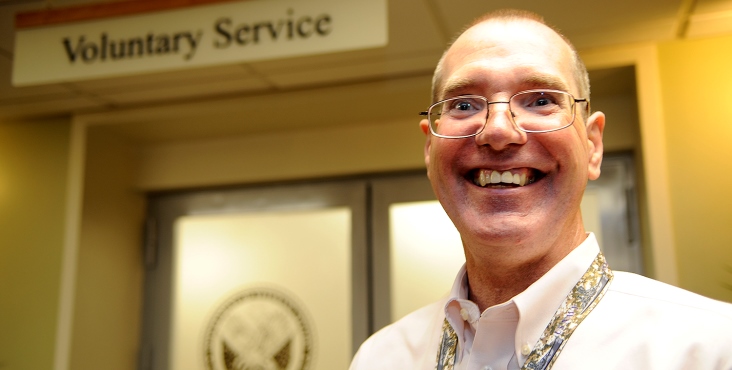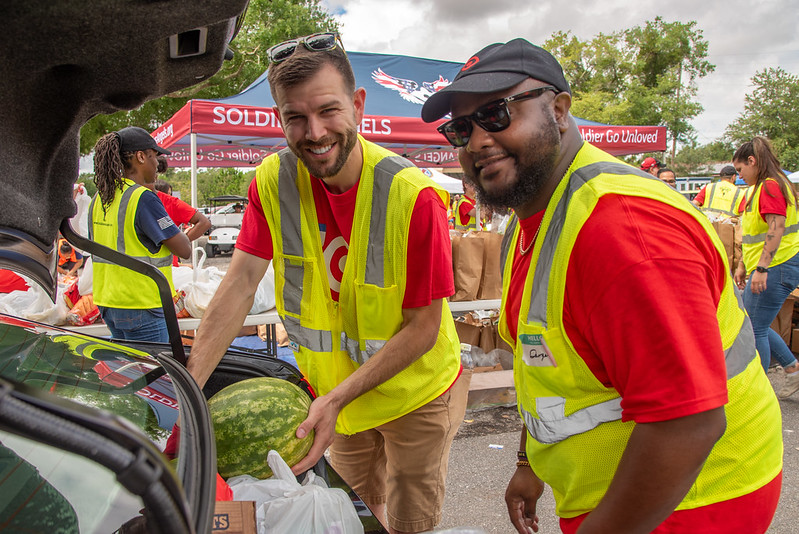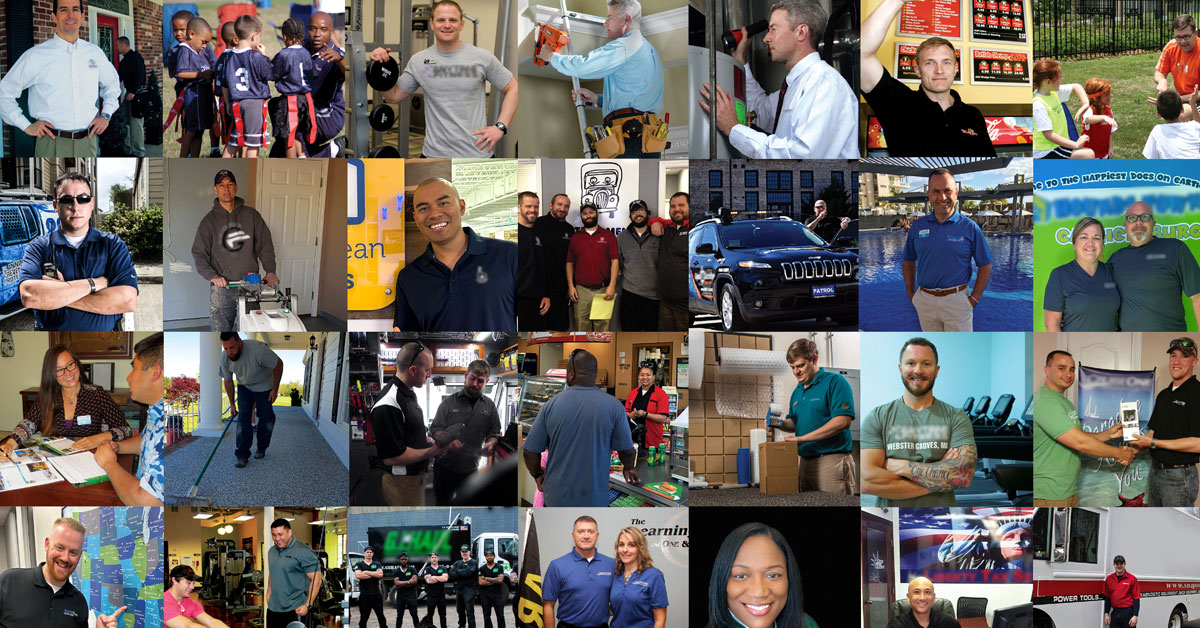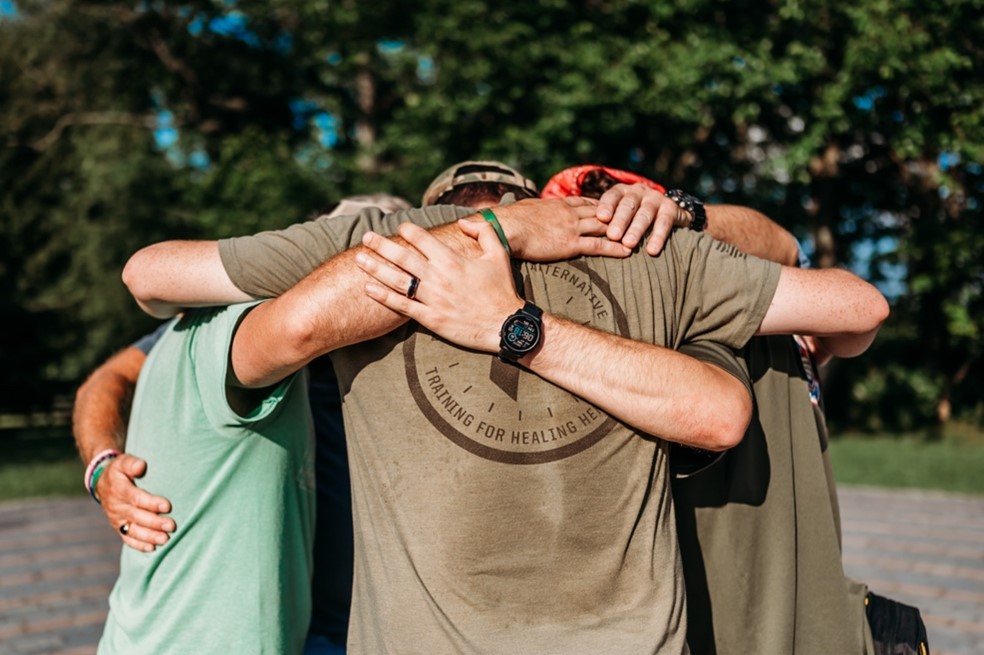Despite the odds, Emerson Beach survived being shot in the head twice while serving in the U.S. Navy. The traumatic brain injury ended his military service at age 24, but Beach went on to earn a degree from The Citadel, leading to a 20-year career as an electrical engineer.
A few years ago, Beach found it difficult to work and started experiencing epileptic seizures. His VA provider determined that he was no longer able to work and needed brain surgery to remove part of his brain. After the surgery, Beach stopped having seizures, but felt his life started to take a downward spiral.

Heather Friesen and Emerson Beach at work as part of the Charleston My HealtheVet team
“Prior to the surgery, I felt very smart,” said Beach. “After the surgery, I was very limited in spelling, technical activities and remembering. I didn’t ever feel like doing anything, and even was hospitalized for suicidal thoughts.”
Beach’s provider suggested that he start volunteering at the Ralph H. Johnson VA Medical Center in Charleston, South Carolina to help keep him actively engaged. He did just that, and more.
“We have three computers in the hospital and Emerson takes Veterans to these computers and shows them how to find a forgotten password, lab results and answers their questions,” said Heather Friesen, a My HealtheVet coordinator who works with Beach. “He really helps Veterans see the value in My HealtheVet and he takes the time to explain the benefits available to them.”

Emerson Beach assists Veteran, Ron Keeler
Since 2012, Beach has been volunteering 40 hours a week with the Charleston My HealtheVet team. He enjoys helping fellow Veterans and on a good day he has been known to help 20 or more register for My HealtheVet.
“I couldn’t just stay at home all day,” said Beach. “I needed to do something meaningful and I feel like I add value by helping Veterans sign up for My HealtheVet.”
Beach also participates twice a week in a program run by Rein and Shine, an equine therapy facility. The program was introduced through the Charleston VAMC’s Veteran Enrichment Center, a transitional learning center that teaches skills and promotes community opportunities essential for Veterans to develop an active and meaningful life in their home community. During his therapy sessions he cares for, rides and interacts with the horses.
Beach also volunteers as a local expert and helps teach other Veterans about how to care for and ride the horses.
“I never thought I would ride a horse, or help teach someone else how to ride a horse,” Beach said. “The program is great for Veterans because it allows them to learn step-by-step and helps build them up, which keeps them in the program.”
Each month, the Charleston ABC News 4 chooses one person to win a Jefferson Award for community service. The Jefferson Awards Foundation, founded in 1972 by the American Institute for Public Service, empowers others to have a maximum impact on the things and people they care about the most. This year, Beach was chosen as one of the Jefferson Awards winners, a well-deserved honor because he truly exemplifies someone who does extraordinary things without asking for recognition.
About the author: Treva Lutes is a program specialist for VHA’s Office of Connected Care.
Topics in this story
More Stories
Soldiers' Angels volunteers provide compassion and dedication to service members, Veterans, caregivers and survivors.
Veterans are nearly three times more likely to own a franchise compared to non-Veterans.
Built by Veterans for Veterans, Warrior PATHH is an in-person program designed to train you to manage struggle, trauma and hardship.







I have a disabled vet friend who wanted to help his fellow veterans, so he signed up as a volunteer at our local VA office. He was told that if he could volunteer, that it proved that he was able to work, so if he continued volunteering he would lose his disability status and benefits. That’s just pitiful.
Expedited decisions for WWII veterans a dwindling bunch that is on expedited still lags behind. These claims should be handled with priority. Progression of a compensated claim is not in the protocol. The veteran deserves the benefit of the doubt under secondary connection yet they continue the C and P process to delay decisions..
I totally agree, it took me 10 years from my first experience with C&P to recieve compensation for PTSD.
I was so inspired by Mr. Beach’s story. Volunteering can make such a difference in our own life as well as in the life of those we serve.
I know first hand how depressing a disability can be. I used to be a young, strong veteran and college graduate. Then during middle age after the birth of my third son I developed bipolar disorder. I am still able to work part-time but after reading Mr. Beach’s story I will definitely do volunteer work too.
Mr. Emerson Beach gives hope to thousands, if not millions of people. Very inspiring story.